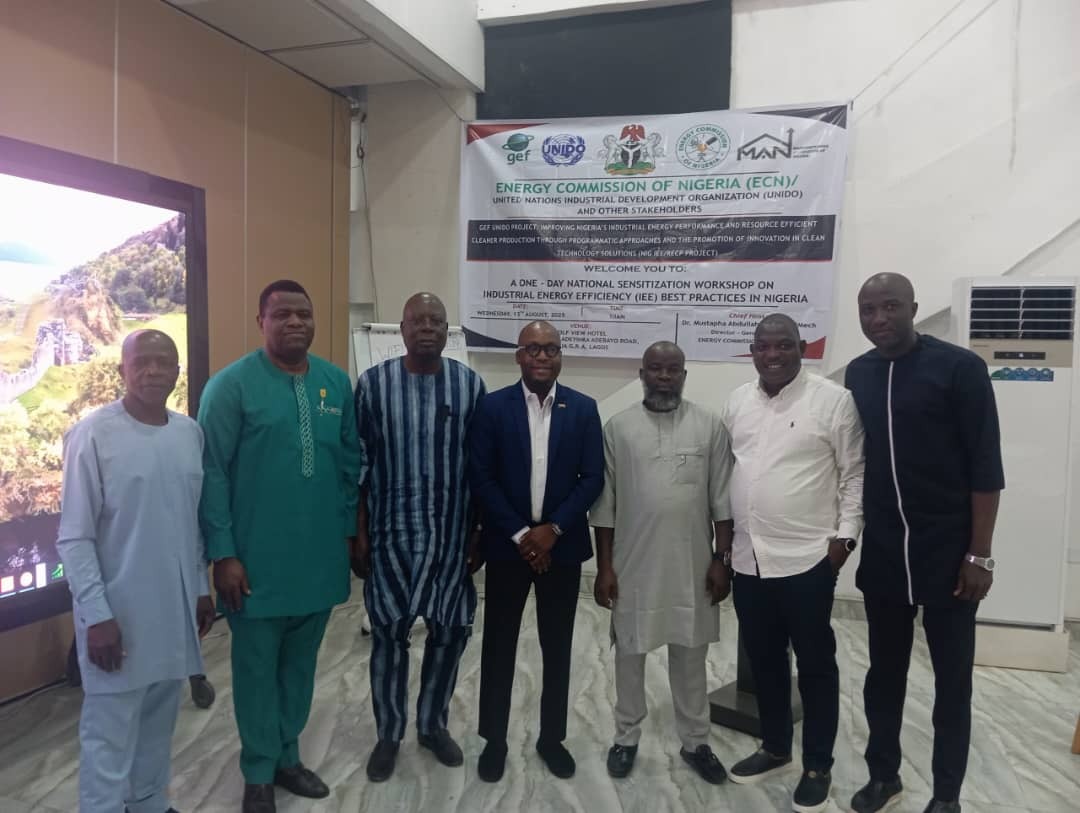The Energy Commission of Nigeria (ECN) has launched the Industrial Energy Efficiency (IEE) Database to strengthen Nigeria’s industrial energy efficiency policies and promote innovation in clean technology solutions.
The Director-General, ECN, Dr. Mustapha Abdullahi, made this known during a public presentation of the IEE Database held in Abuja.
The event was organised by the Commission in partnership with the United Nations Industrial Development Organisation (UNIDO) /Global Environment Facility (GEF)’s project titled ‘Improving Nigeria’s Industrial Energy Performance and Resource Efficient Cleaner Production through Programmatic Approaches and the Promotion of Innovation in Clean Technology Solutions (NIG IEE/RECP Project)’. Under the project, the Commission focused on ‘Strengthening National Industrial Energy Efficiency (IEE) Policies and Regulatory Frameworks towards the adoption of UNIDO’s Energy Management Systems Standards (EnMS/ESO/ISO 50001) in Nigeria’.
Represented by Engr. Gbenga Olokede of Energy Transition and Linkages Department of the Commission, Abdullahi stressed that IEE Database was developed to store and manage energy consumption data from selected energy-intensive industries in Nigeria.
He emphasised the importance of data-driven decision-making in energy policy, as the database can bring stored data into a format that allows for further display and interpretation.
Abdullahi highlighted the importance of data collection, storage, and analysis in promoting energy efficiency and conservation in Nigeria’s industrial sector.
He noted that ECN’s goal is to promote energy efficiency and conservation best practices in Nigeria’s industrial sector.
“The database that would be presented to you is user-friendly, easy to navigate and accessible to all interested parties. It allows for entering new data, updating existing data, and correcting irregularities within a given dataset.
“We are in the era of evidence-based policy-making that requires real-life and transparent data. Without comprehensive knowledge of how industries acquire and use energy, attempts to develop policies that promote energy management system (EnMs) and Energy Supply Optimisation (ESO) that seeks to save energy and/or protect the environment would be baseless and counter-productive,” he said.
The DG charged policymakers to develop an appropriate policy and legislative framework based on actual data to reduce the negative impacts of epileptic power supply.
While concluding, Abdullahi noted that ECN’s goal is to promote energy efficiency and conservation best practices in Nigeria’s industrial sector.
The Commissioner for Energy and Mineral Resources, Lagos State, Biodun Ogunleye, in his address, highlighted the potential for industrial energy efficiency to drive sustainable economic growth, reduce energy consumption, and support Nigeria’s environmental goals.
Ogunleye emphasised that adopting energy efficiency best practices can deliver a 10 to 30 per cent reduction in energy consumption, significant cuts in Greenhouse gas emissions, and improved productivity and profitability.
He disclosed that Lagos hosts over 60 per cent of Nigeria’s manufacturing activity, making industrial energy efficiency a national lever for sustainable economic growth.
The Commissioner challenged industrial leaders to make energy efficiency a board-level agenda, commit to ISO 50001 certification, and partner with government bodies to access technical and financial support.
In his comments, Engr. Okon Ekpenyong, Industrial Energy Efficiency Consultant to the ECN, said the database, developed under the GEF-UNIDO project is expected to support industries in tracking energy use, identifying opportunities for efficiency, and adopting cleaner production techniques.






